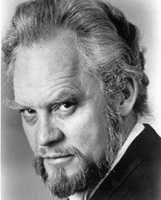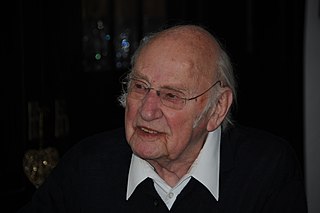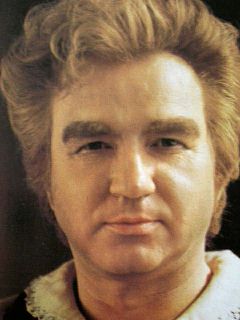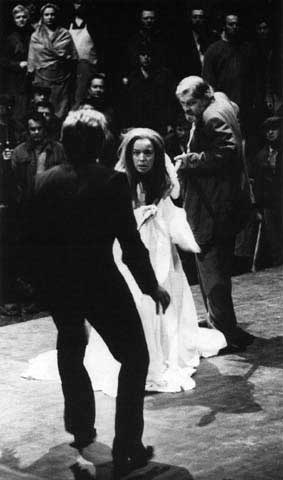Related Research Articles

The Bayreuth Festival is a music festival held annually in Bayreuth, Germany, at which performances of stage works by the 19th-century German composer Richard Wagner are presented. Wagner himself conceived and promoted the idea of a special festival to showcase his own works, in particular his monumental cycle Der Ring des Nibelungen and Parsifal.

Theo Adam was a German operatic bass-baritone and bass singer who had an international career in opera, concert and recital from 1949. He was a member of the Staatsoper Dresden for his entire career, and sang at the Bayreuth Festival from 1952 to 1980. He particularly excelled in portraying roles by Richard Wagner, especially Wotan in Der Ring des Nibelungen, which he also performed at the Metropolitan Opera, among others. In concert, he was a much admired Bach singer and also drew acclaim for his interpretation of the title character of Mendelssohn's Elijah. He was a voice teacher at the Musikhochschule Dresden.

Dame Gwyneth Jones is a Welsh dramatic soprano, widely regarded as one of the greatest Wagnerian sopranos in the second half of the 20th century.

Sir Jeffrey Philip Tate was an English conductor of classical music. Tate was born with spina bifida and had an associated spinal curvature. After studying medicine at the University of Cambridge and beginning a medical career in London, he switched to music and worked under Georg Solti at the Royal Opera House, Covent Garden, before making his conducting debut in 1979 at the Metropolitan Opera, New York. He held conducting appointments with the English Chamber Orchestra, Rotterdam Philharmonic Orchestra and Hamburg Symphony Orchestra, among others, and was the first person to be appointed principal conductor of the Royal Opera House. He was knighted for his services to music in 2017.
Siegfried Jerusalem is a German operatic tenor. Closely identified with the heldentenor roles of Richard Wagner, he has performed Siegfried, Siegmund, Lohengrin, Parsifal, and Tristan to wide acclaim. Since the 1990s, he has focused on lieder, particularly those by Strauss, Mahler and Schumann.

René Pape is a German operatic bass. Pape has received two Grammys, was named "Vocalist of the Year" by Musical America in 2002, "Artist of the Year" by the German opera critics in 2006, and won an ECHO award in 2009.

Thomas Stewart was an American bass-baritone who sang an unusually wide range of roles, earning global acclaim particularly for his performances in Wagner's operas.

Simon John O'Neill is a New Zealand-born operatic tenor. In 1998, his image appeared on the New Zealand one-dollar performing arts postage stamp.

Peter Hofmann was a German tenor who had a successful performance career within the fields of opera, rock, pop, and musical theatre. He first rose to prominence as a heldentenor at the Bayreuth festival's Jahrhundertring in 1976, where he drew critical acclaim for his performance of Siegmund in Richard Wagner's Die Walküre. He was active as one of the world's leading Wagnerian tenors over the next decade, performing roles like Lohengrin, Parsifal, Siegmund and Tristan at major opera houses and festivals internationally.

Franz Mazura was an Austrian bass-baritone opera singer and actor. He performed at the Bayreuth Festival from 1971 for 25 years and at the Metropolitan Opera for 15 years. He was made a Kammersänger in 1980 and an Honorary Member of the Nationaltheater Mannheim in 1990. He most often played villains and strange characters, with signature roles including Klingsor in Wagner's Parsifal. Mazura took part in world premieres, such as the double role of Dr. Schön and Jack the Ripper in the world premiere of the completed version of Alban Berg's Lulu at the Paris Opera in 1979, and as Abraham in Giorgio Battistelli's Lot in 2017. Two of his recordings received Grammy Awards. His voice was described as with dark timbre, powerful and like granite, with perfect diction. His acting ability was described as "well-supplied with vivid imaginative touches, whether deployed in comic roles or characters of inexorable malevolence. Mazura could achieve more impact with a lifted eyebrow or a belligerently thrust chin than many artists could with a ten-minute monologue." He had a long career, appearing at the Staatsoper Berlin the night before his 95th birthday.

Alan Titus is an internationally celebrated baritone.

Reiner Goldberg was a German operatic heldentenor who made an international career performing and recording. He appeared at the Berlin State Opera from 1972, and was a member of the ensemble from 1981. Goldberg achieved attention when he sang the role of Wagner's Parsifal for a 1982 opera film directed by Hans-Jürgen Syberberg. He then became known for performing the tenor roles of Wagner's stage works in leading opera houses in Europe and worldwide, such as the Bayreuth Festival where he appeared from 1986 as Tannhäuser, Stolzing in Die Meistersinger von Nürnberg, Siegfried in both Siegfried and Götterdämmerung, and Erik in Der fliegende Holländer. He performed at the Metropolitan Opera as Siegfried, conducted by James Levine and alongside Hildegard Behrens as Brünnhilde, resulting in a recording that won a Grammy Award.
Wolfgang Neumann is an Austrian internationally known operatic heldentenor, who specialized in the operas of Richard Wagner.

The Jahrhundertring was the production of Richard Wagner's Ring cycle, Der Ring des Nibelungen, at the Bayreuth Festival in 1976, celebrating the centenary of both the festival and the first performance of the complete cycle. The festival was directed by Wolfgang Wagner and the production was created by the French team of conductor Pierre Boulez, stage director Patrice Chéreau, stage designer Richard Peduzzi, costume designer Jacques Schmidt and lighting designer André Diot. The cycle was shown first in 1976, then in the following years until 1980. It was filmed for television in 1979 and 1980. While the first performance caused "a near-riot" for its brash modernity, the staging established a standard, termed Regietheater, for later productions.

Gabriele Schnaut was a German classical singer who started her operatic career as a mezzo-soprano in 1976 and changed to dramatic soprano in 1985. She performed at the Bayreuth Festival from 1977, in the filmed Jahrhundertring, to 2000. After a breakthrough performance as Richard Wagner's Isolde at the Hamburgische Staatsoper in 1988, she became a leading dramatic soprano on the stages of the world in roles such as Wagner's Brünnhilde and Richard Strauss' Elektra. From 2008, she ventured into dramatic mezzo-soprano character roles such as Klytämnestra in Elektra, Herodias in Salome and Kostelnicka Buryjovka in Leoš Janáček's Jenufa.
Hannelore Bode is a German operatic soprano. She performed at the Bayreuth Festival from 1968 to 1978, including Elsa in Lohengrin, Eva in Die Meistersinger von Nürnberg, and several parts in the 1976 Jahrhundertring, including Sieglinde in Die Walküre. She performed internationally and recorded operas with conductors such as Eugen Jochum, Silvio Varviso and Pierre Boulez.
Norma Sharp is an American operatic soprano. She is known for singing Mozart and Richard Strauss, but also sang Wagner roles at the Bayreuth Festival. She worked mostly in Germany, made an international career, and has been a professor of voice at the Hochschule für Musik "Hanns Eisler" from 1992.
Gerd Nienstedt was a German and Austrian opera singer, bass and bass-baritone. After an international career at major opera houses and the Bayreuth Festival, he was also a theatre director, stage director and academic voice teacher.
Samuel Youn is a South Korean operatic bass baritone.

Eva Randová is a Czech operatic mezzo-soprano who made an international career based in Germany. She appeared at major opera houses including the Metropolitan Opera, and at festivals such as the Bayreuth Festival. She is known for performing Czech operas by Leoš Janáček and Antonín Dvořák.
References
- ↑ "No. 47104". The London Gazette (3rd supplement). 31 December 1976. p. 42.
- ↑ "No. 50155". The London Gazette (2nd supplement). 15 June 1985. p. 1.
- ↑ "No. 52953". The London Gazette (2nd supplement). 13 June 1992. p. 29.
- ↑ "Donald McIntyre". 23 November 2020.
- The Concise Oxford Dictionary of Opera, by John Warrack & Ewan West, Oxford University Press, 1996. ISBN 0-19-280028-0